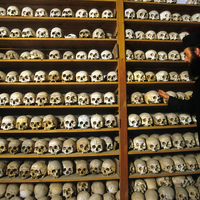Mentions
- Post
“The West, over the duration of its global hegemony, would prove itself brilliantly adept at exploiting this realisation. Repeatedly, Christian concepts were re-packaged for non-Christian audiences. Today, as in the 18th century, a doctrine such as that of human rights is far likelier to be signed up to if its origins among the canon lawyers of medieval Europe is kept scrupulously concealed. The emphasis placed by United Nations agencies on “the antiquity and broad acceptance of the conception of the rights of man” was a necessary precondition for their claim to a global, rather than a merely Western, jurisdiction.”

- Post
“Humanism, despised by Nietzsche as an ideology to which the English were peculiarly prone, was dismissed by him as palpable idiocy:
“When the English actually believe that they know ‘intuitively’ what is good and evil, when they therefore suppose that they no longer require Christianity as the guarantee of morality, we merely witness the effects of the dominion of the Christian value judgment.”’

- Post
“But how common, in antiquity, are the fundamental tenets of humanism: that humans — no matter their sex, their place of origin, their class — are all of equal value; and that those who walk in darkness must be brought into light? Not common at all, I would say.
To live in a Western country is to live in a society that for centuries — and in many cases millennia — has been utterly transformed by Christian concepts and assumptions. So profound has been the impact of Christianity on the development of Western civilisation that it has come to be hidden from view.
Yet to believe in the existence of human rights requires no less of a leap of faith than does a belief in, say, angels, or the Trinity. The origins of the concept lie not in “the application of the methods of science” so prized by the Amsterdam Declaration but in medieval theology.”

